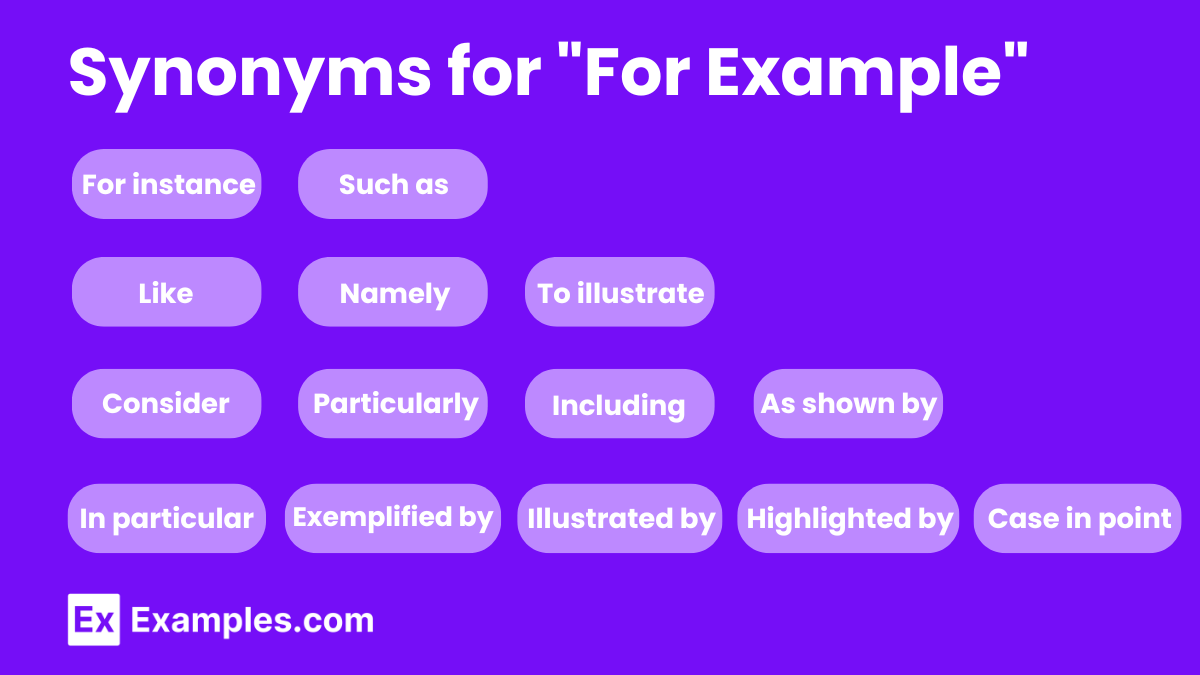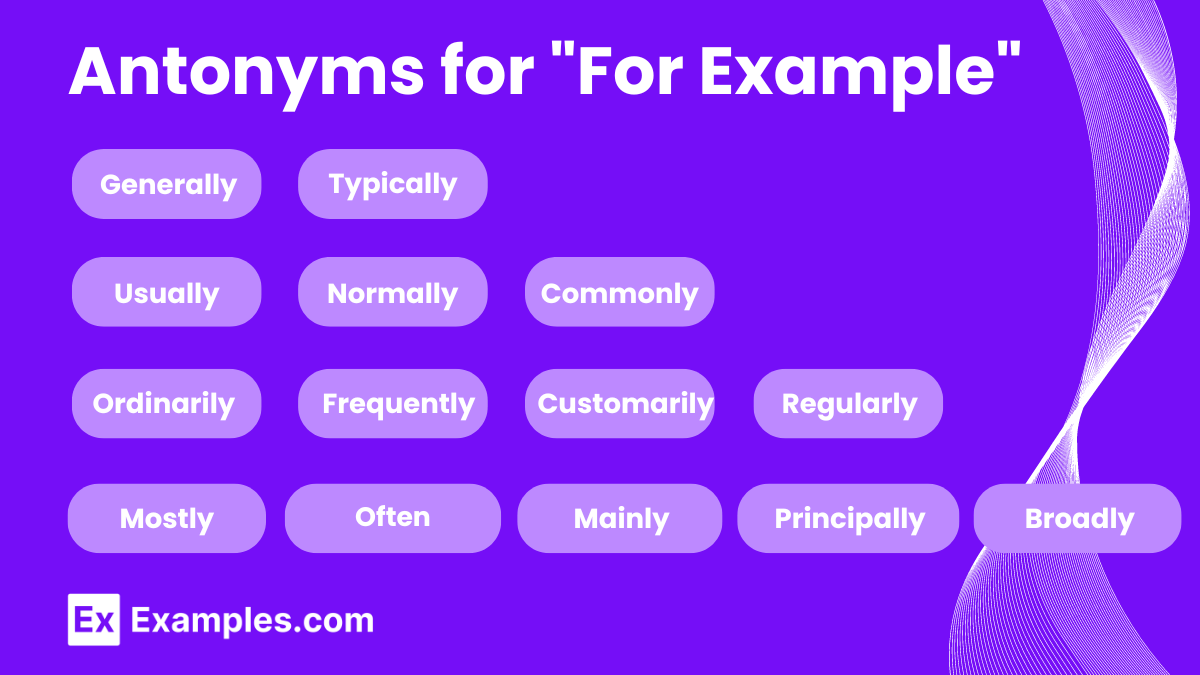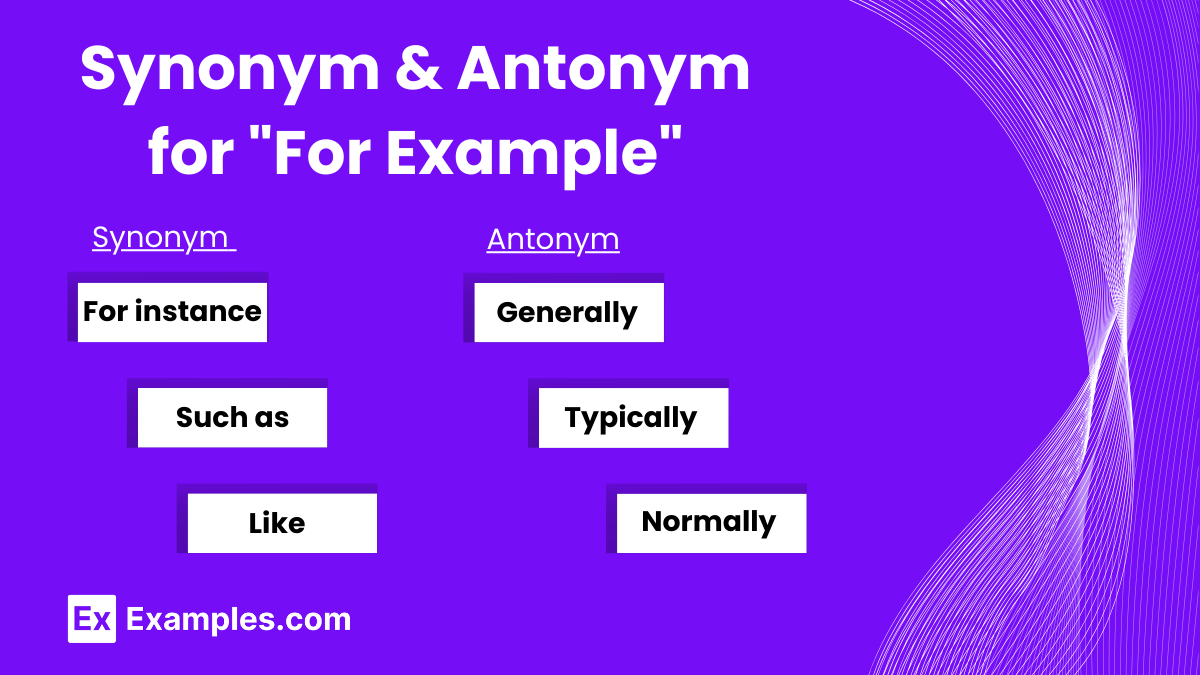Synonym & Antonym for “For Example”
The phrase “for example” is a staple in both spoken and written English, used extensively to introduce instances or clarify points. To enhance the versatility of your language, it’s beneficial to explore various synonyms that can substitute for “for example” and understand antonyms that contrast with its usage.
Synonyms for “For Example”

Here are some alternative phrases that serve the same purpose as “for example,” each bringing its unique nuance:
- For instance – Common in both formal and informal context.
- Such as – Introduces examples specifically without implying a full list.
- Like – Informal; great for casual conversations.
- Namely – Used when specifying detailed examples.
- To illustrate – Shows how an example is used to explain a complex idea.
- Consider – Encourages the audience to think of an example in support of an argument.
- Particularly – Highlights a specific example from a broader group.
- Including – Used to add one or more examples into a category.
- As demonstrated by – Points to an example that proves a point or idea.
- As shown by – Similar to “as demonstrated by,” it introduces evidence through examples.
- As evidenced by – Introduces examples that support an evidence-based claim.
- In particular – Focuses attention on a specific instance.
- Especially – Emphasizes examples that are particularly notable.
- By way of illustration – Introduces examples that clarify a subject.
- Exemplified by – Shows something by giving examples.
- Illustrated by – Used when an example visually supports the explanation.
- Highlighted by – Draws attention to examples that are particularly illuminating.
- One example is – Starts a sentence to introduce a specific example.
- Case in point – Introduces an example that perfectly illustrates a broader point.
- Manifested by – Shows how something is demonstrated through examples.
Antonyms for “For Example”

Antonyms of “for example” are used to convey generalization rather than specificity. Here are some phrases that serve as antonyms:
- Generally – Used to indicate what is usually true or common, without focusing on specific instances.
- Typically – Describes what is standard or expected based on common occurrences.
- Usually – Refers to what often happens under normal circumstances.
- Normally – Indicates what is regular or expected based on usual conditions.
- Commonly – Describes what frequently occurs in a general sense.
- Ordinarily – Used to indicate what is typical or habitual.
- Frequently – Describes events or actions that occur often, without specifying examples.
- Customarily – Pertains to what is done traditionally or habitually.
- Regularly – Indicates consistent or repeated patterns.
- Mostly – Used to describe the majority of occurrences or cases.
- Often – Refers to a high frequency of occurrences, generally speaking.
- Mainly – Indicates that the primary focus or majority concerns a general aspect.
- Predominantly – Describes something that is dominant or prevalent in a general sense.
- Principally – Focuses on the main or major part of something, not specifics.
- Broadly – Refers to a wide or general view, without delving into details.
- Universally – Indicates something that is applicable or occurring everywhere.
- Widely – Describes something that is broadly or extensively recognized or practiced.
- As a rule – Suggests a general principle or tendency.
- In general – Used to summarize a situation or condition, overlooking specific details.
- By and large – Implies a general statement or conclusion, generally accurate but without specific focus.
Expanding your vocabulary to include synonyms of “for example” can make your language more precise and varied, enhancing both your writing and conversational skills. Conversely, understanding and using antonyms allows you to transition smoothly from specific examples to general statements, providing a broader context to your audience.



